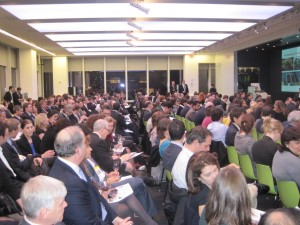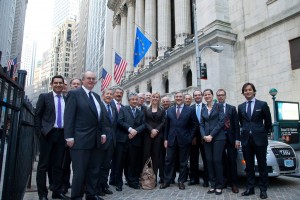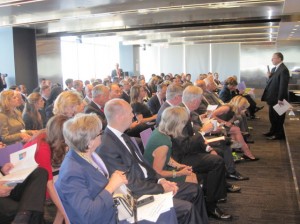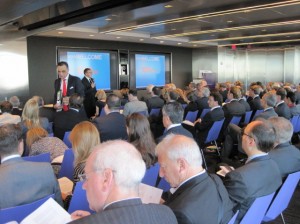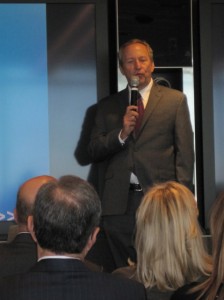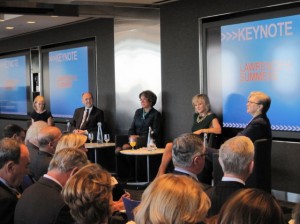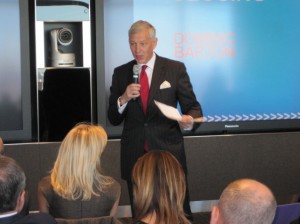Highlights of Past Events - 2012
[01/12/12] EACC Global Trade, Investment & Economic Outlook for 2012
EACC Economic Update attracted a full house at Bloomberg, LP.
On January 12, 2012, the European American Chamber of Commerce, the Foreign Trade Commissioners Association, and Bloomberg Government held The Global Trade, Investment and Economic Outlook: Prospects for U.S. and Foreign Companies.
The program was an enlightening and engaging debate on global trade, investments and the economic outlook on 2012 and beyond. Topics included forecasts for international growth, investment opportunities and risks, and the impact of government action.
Panelists included James Bacchus, Chair, Global Practice Group, Greenberg Traurig, LLP; Dr. Jorg Stephan, Head of the Representative Office, Deutsche Bundesbank; and Dr. Neal Soss, Managing Director & Chief Economist, Credit Suisse. The discussion was moderated by Sandford Reback, Chief Trade Analyst, Bloomberg Government, and the program was introduced by Richard Martin, Partner and EACC Board member, of Orrick, Herrington & Sutcliffe, LLP.
Close to 300 business leaders from U.S. and European companies, representatives from the Foreign Trade Commissioners association and numerous representatives from Consulates and trade agencies attended, a 25% increase from the EACC’s last Economic Update also held Bloomberg event. Feedback on the event has been uniformly positive. We look forward to our next event with Bloomberg and the FTCA.
[05/11/12] EACCNY hosts EU Vice President and Commissioner for Industry & Entrepreneurship, Antonio Tajani at NYSE
On May 11, 2012, the European American Chamber of Commerce hosted a high profile, high energy gathering of senior level transatlantic business officials assembled at the New York Stock Exchange to welcome visiting European Union Vice President and Commissioner for Industry and Entrepreneurship, Antonio Tajani.
Vice President Tajani was accompanied by a delegation of prominent European industry federations from the chemical, pharmaceutical, luxury goods, energy, construction and venture capital sectors, with the objective of internationalizing businesses in the EU and the U.S. and to start a trans-Atlantic dialog to exchange ideas and best practices across different industry sectors.
Vice-President Tajani directs at the EU level enterprise and industrial policies holding a wide range of responsibilities for SME and industrial innovation; regulation of manufactured goods; and standardization. His visit served to foster industrial cooperation with the United States in order to support growth on both sides of the Atlantic.
This event was clear recognition of the European-American Chambers of Commerce by the European Union as the leading European organization in the United States for transatlantic trade. All of the EACC chapters, New York, Cincinnati, Princeton and Paris contributed to the success of the event.
The EACC network will be continuing the dialog with the delegation and representatives from EU Business associations across the various EACC chapters and their diverse membership. And this high-level exchange is expected to lead to future business growth and opportunities.
Prior to his New York City stop, Vice President Tajani met senior political representatives, members of Congress and key industry federations in Washington, D.C.
The trip concluded with a visit of General Assembly in the Flatiron district and to the Brooklyn Navy Yard.
[07/12/12] Danish Minister for European Affairs, Nicolai Wammen, spoke about the European economy at the EACCNY
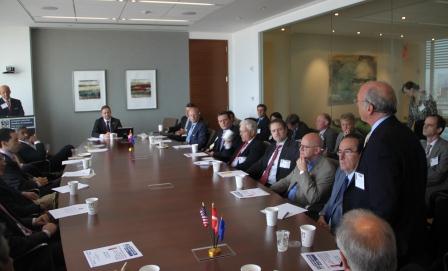
The Minister engages in a Q&A session with business leaders at EACC New York
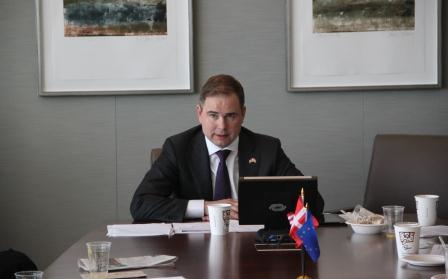
Minister Nicolai Wammen
The European American Chamber of Commerce New York hosted a Newsmaker Breakfast for the Danish Minister for European Affairs, Nicolai Wammen, during his visit to New York.
The ministers presentation “Europe – The Path Ahead” focused on the current economic situation in Europe, the main results achieved during the recently completed Danish EU Presidency and not least on creating growth and jobs across the Atlantic.
“I am not so fortunate as to live in New York every day, but I know that some US press has lately been engaged in what we might refer to as ‘euro-bashing’. I am here today to tell you that I believe the situation is too serious for blame games. It is time for more cooperation across the Atlantic and Europe is delivering results.”
The transatlantic area represents around half of the world’s GDP, and one-third of total world trade, and the Danish Presidency has given high priority to bilateral and regional free trade agreements, including securing significant progress in important discussions on strengthening trade and investment links with the US.
New Free Trade Agreement
The minister referred to the discussions on a new Free Trade Agreement between the EU and the US.
“I know that your businesses work day in and day out to strengthen transatlantic trade. In my view, such strengthened commercial ties between the EU and the US could provide a much needed boost to our economies, and it’s time to engage in discussions.”
Steps Ahead
With regards to the current economic situation in Europe, the minister highlighted a number of joint initiatives that have been taken, including the so-called Fiscal Compact [the Treaty on Stability, Coordination and Governance in the Economic and Monetary Union], enlargement of joint rescue funds and strengthening of financial regulation and supervision. He also emphasized that this does not mean that Europe is “home free”:
“There is no silver bullet. We have taken important steps in the right direction on the EU level, but it is also the individual EU member states that have the competency in this area.”
In addition to the efforts to stabilize the European economy, the Danish presidency has also increased efforts to promote growth, in a “two-pronged approach”.
“Very few member EU member states have the option of increasing spending. There is no alternative to the consolidation measures. Therefore we have had to find smarter ways of boosting growth in Europe,” said the minister, referring to the new “growth pact”, reached at the end of the Danish Presidency.
After the presentation, the minister engaged in a thorough Q&A session with the audience, answering questions on how to strengthen commercial ties between the US and EU, how to strengthen the economic and financial supervision and how to create growth without falling deeper into debt.
[10/11/12] US Launch of the Henry Jackson Initiative Hosted by Bloomberg LP in partnership with the European American Chamber of Commerce
On October 11 2012, over 130 guests gathered at Bloomberg LP, New York, to mark the launch of the Henry Jackson Initiative (HJI) in the US.
The New York launch event of the Henry Jackson Initiative was opened by Norman Pearlstine, Chief Content Officer at Bloomberg who introduced Lady Lynn Forester de Rothschild, co-chair of the HJI’s inaugural task force for Inclusive Capitalism. Lady Lynn started off the program with a short presentation on the genesis of the HJI, the organisation’s objectives and the urgency for business to become engaged in its work. She summarized her points with an illustration by the economist Lawrence Katz comparing the US economy with an apartment block where, on account of growing inequality, the penthouses have become more spacious whereas the apartments in the middle have become squeezed, the basement is flooding but, worst of all, the elevator (signifying social mobility) is broken.
The first of the morning’s keynote speakers was Lawrence Summers, Charles W. Eliot University Professor and President Emeritus of Harvard University. Mr Summers gave his support to the HJI’s white paper and, in particular the vision of inclusive capitalism. Mr Summers also urged the HJI to think more about what a truly inclusive capitalism would look like and how the entire business environment and government policy ecosystem must contribute towards this vision.
Lawrence Summers was followed by a panel of business leaders, moderated by Diane Brady of Bloomberg Business Week, that included: Laura D’Andrea Tyson, S.K. and Angela Chan Professor in Global Management, Haas School of Business, University of California Berkeley, Kay Koplovitz,Chairman and CEO, Koplovitz & Co., Sir John Peace,Chairman, Burberry, Experian & Standard Chartered and Kathryn Wylde, President and CEO, the Partnership for New York City.
The panel discussed whether the pathways chosen for focus by the HJI were applicable on both sides of the Atlantic (the pathways are education for employment, support of SMEs and start-ups and long term governance) and what business can do to work towards a truly inclusive capitalism in which the benefits of the system are more broadly shared by all.
The discussion was followed by an interview conducted by Norman Pearlstine with Glenn Britt, CEO of Time Warner Cable Inc. on ‘Connect a Million Minds’, a five-year, $100 million cash and in-kind philanthropic initiative to address America’s declining proficiency in science, technology, engineering and math (STEM).
The floor was then opened up the audience to ask questions and to answer those posed by Bloomberg hosts Trish Regan, of Street Smart, and Diane Brady. The event was concluded by Dominic Barton, Global Managing Director of McKinsey and HJI task force for Inclusive Capitalism co-chair, who gave a call to business action to adopt actions and behaviours in line with the vision of inclusive capitalism and the pathways highlighted in the HJI’s report.
The creation of the HJI was well documented in global media at the time of its UK launch in May 2012 and the launch of the HJI in the US was highlighted in interviews on the Piers Morgan Show on CNN, Fox Business and Bloomberg television on the evening before and day of the launch in New York on October 11. The European American Chamber of Commerce was a central part of the event, inviting its members and supporting the vision of the HJI more broadly through outreach and connecting interested parties behind the scenes.
About the HJI
The HJI is a business-led initiative that seeks to build a more inclusive capitalism through highlighting business best practice, connecting leaders for collaborative working, partnering on original projects with stakeholders and communicating the benefits of capitalism to an external audience.
The HJI supports all actions supporting a more inclusive capitalism, but focuses on three pathways in which it believes business action can deliver demonstrable outcomes:
- Education for employment and job creation – matching the needs of today’s and tomorrow’s jobs market with the skills of the workforce
- Supporting start-ups and SMEs – ensuring small and medium sized companies have access to financial and non-financial support and fostering en environment for entrepreneurship
- Long term governance – reorienting business practice and the stewardship of companies away from short-termism
The essence of the HJI’s argument is that business needs to take the lead in the areas that need improvement most. These businesses understand it is in their best interest to improve the overall environment for business and the economy. As long as industry, innovation and enterprise are anchored by inclusivity and responsibility, the capitalist system that has made our societies great will continue to do so.
Select Media Coverage:
- The New York Observer: Business, Policy Leaders Set to Launch “Inclusive Capitalism” Initiative in U.S
- Bloomberg TV: Barton – World Will Be Volatile for Next Ten Years
To get involved in this initiative email us. For a copy of the report call us at 212-808-2707.
![European American Chamber of Commerce New York [EACCNY] | Your Partner for Transatlantic Business Resources](https://eaccny.com/wp-content/uploads/2020/06/eaccny-logo.png)
